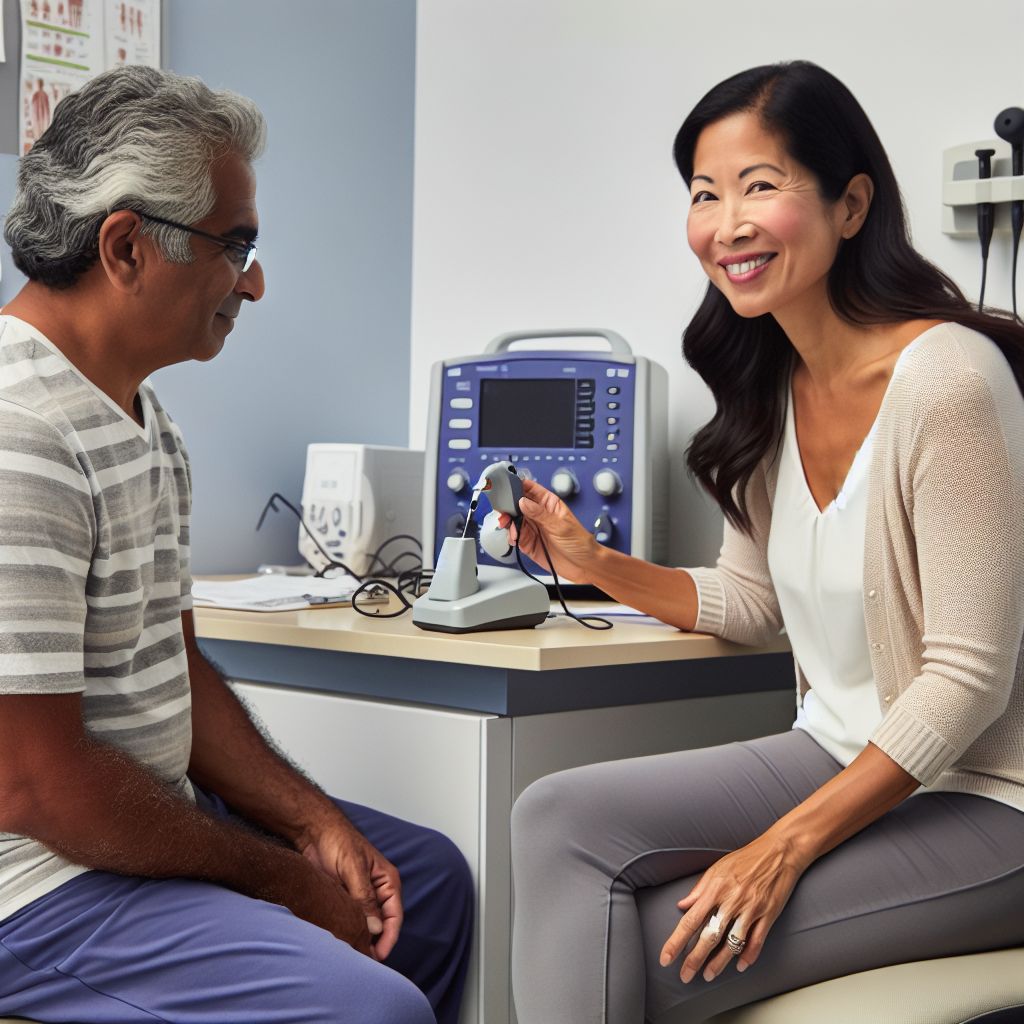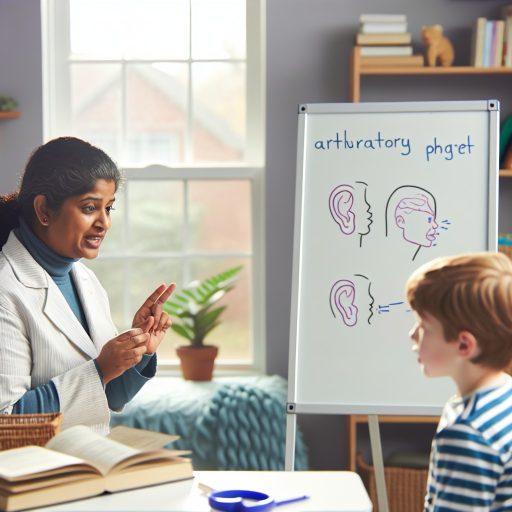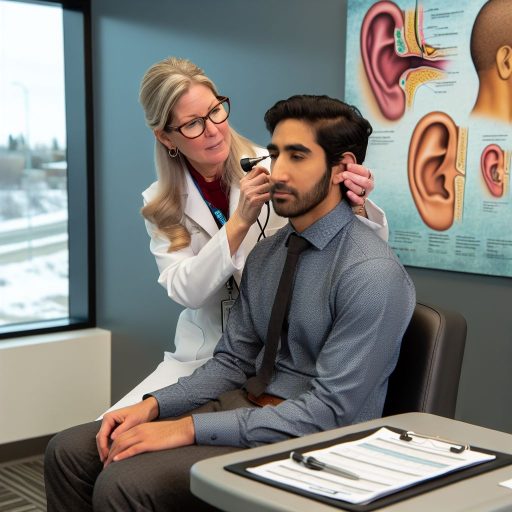Overview of the Audiology Profession
Understanding Audiology
Audiology is a branch of medicine focused on hearing and balance.
Audiologists diagnose hearing loss and balance disorders.
They develop treatment plans to improve patients’ quality of life.
This profession combines science, technology, and healthcare.
Education and Training
Audiologists typically hold a doctoral degree in audiology.
Most programs require a combination of coursework and clinical practice.
After graduation, they must pass a national examination.
Continuing education helps audiologists stay current with new advancements.
Work Environment
Audiologists work in various settings, including hospitals and private practices.
Some work in schools, helping children with hearing impairments.
Others may conduct research or work for hearing aid manufacturers.
Their work environment can be collaborative, often involving other healthcare providers.
Key Responsibilities
Audiologists perform hearing assessments using specialized equipment.
They fit patients with hearing aids and other assistive devices.
Education on hearing preservation and communication strategies is crucial.
Documenting findings and providing reports to doctors is also common.
Challenges in the Profession
One major challenge is the increasing prevalence of hearing loss.
Patients often wait too long to seek help, complicating treatment.
Additionally, keeping up with technology advancements can be demanding.
Finally, audiologists may face difficulty with insurance coverage for services.
Rewards of Being an Audiologist
Helping patients regain their hearing can be immensely rewarding.
Improved communication enhances patients’ lives and relationships.
Additionally, the profession offers a stable job market due to demand.
Audiologists play a vital role in promoting public health awareness.
Common Challenges Faced by Audiologists
High Emotional Demand
Audiologists frequently encounter emotionally charged situations.
Unlock Your Career Potential
Visualize a clear path to success with our tailored Career Consulting service. Personalized insights in just 1-3 days.
Get StartedPatients often experience frustration over hearing loss.
Empathy is crucial in these interactions.
Additionally, managing patient expectations can be challenging.
Technological Advancements
The field of audiology continuously evolves with technology.
Staying updated with new devices requires ongoing education.
The rapid pace of innovation can be overwhelming.
However, mastering these advancements enhances patient care.
Regulatory and Insurance Challenges
Navigating insurance reimbursement can frustrate audiologists.
Many insurers have restrictive policies governing services.
Compliance with regulations adds another layer of complexity.
Moreover, keeping up with billing practices demands attention.
Workload Management
Audiologists often juggle multiple responsibilities.
Balancing patient care and administrative tasks can be tough.
Effective time management skills are essential.
Prioritizing tasks helps ensure efficiency.
Career Advancement Barriers
Advancing in the audiology field can present challenges.
There may be limited opportunities for growth in certain areas.
Networking and professional development are crucial for progress.
Participation in conferences can open new doors.
Rewards and Benefits of Being an Audiologist
Impact on Patients’ Lives
Audiologists play a crucial role in improving patients’ quality of life.
They help individuals regain their sense of hearing.
This restoration allows patients to reconnect with loved ones.
Additionally, audiologists provide support to those with hearing loss.
They offer counseling and effective communication strategies.
Consequently, patients often experience enhanced emotional well-being.
Diverse Career Opportunities
The field of audiology offers various career paths.
Audiologists can work in hospitals, clinics, or private practices.
They may also pursue research or academic roles in universities.
This diversity allows professionals to find their niche.
Furthermore, audiologists can specialize in pediatrics, geriatrics, or vestibular assessment.
Job Security and Demand
The demand for audiologists continues to grow in healthcare.
As the population ages, more individuals experience hearing loss.
This trend creates ample job opportunities in the field.
Moreover, many positions offer competitive salaries and benefits.
Audiologists often enjoy stable employment prospects.
Continuous Learning and Professional Growth
The field of audiology is constantly evolving.
Audiologists regularly engage in continuing education.
This commitment enhances their skills and knowledge.
Additionally, attending workshops and conferences aids professional development.
Many audiologists also participate in research, contributing to advancements in the field.
Community Contribution and Advocacy
Audiologists often act as advocates for individuals with hearing impairments.
They raise awareness about hearing health in communities.
This advocacy helps promote early detection and intervention.
Audiologists may also collaborate with organizations dedicated to hearing loss.
Consequently, they contribute positively to society at large.
See Related Content: Understanding the Scope of Kinesiology in Health Care
Impact of Technology on Audiology Practice
Advancements in Diagnostic Tools
Technology has revolutionized diagnosis in audiology.
Modern audiological equipment provides faster and more accurate results.
For instance, automated audiometers streamline hearing tests.
Additionally, advanced imaging technologies help assess ear conditions.
Development of Digital Hearing Aids
Digital hearing aids have become increasingly sophisticated.
These devices offer customizable settings for individual needs.
Moreover, connectivity features enable wireless streaming from various devices.
Patients benefit from enhanced sound quality and clarity through technology.
Teleaudiology and Remote Services
Teleaudiology has expanded access to audiological care.
This service allows patients to consult audiologists remotely.
Furthermore, it eliminates geographical barriers for many individuals.
Patients appreciate the convenience and flexibility of remote services.
Continuous Learning and Adaptation
Technology requires audiologists to engage in lifelong learning.
Staying updated on new advancements is crucial for effectiveness.
Workshops and webinars aid in enhancing professional knowledge.
Consequently, audiologists can provide the best possible care for patients.
Data Management and Patient Records
Technology simplifies data management in audiology practices.
Electronic health records improve efficiency and accuracy.
Consequently, audiologists can easily track patient progress over time.
This integration fosters better communication with other healthcare providers.
Gain More Insights: Advanced Technologies Used by Modern Podiatrists
The Importance of Continuing Education for Audiologists
Staying Current with Advances
Continuing education helps audiologists stay updated with advancements in technology.
New hearing aids and diagnostic tools emerge regularly in the field.
By staying informed, audiologists can offer better solutions to their patients.
Additionally, they learn about the latest research in hearing health.
Enhancing Clinical Skills
Ongoing education sharpens clinical skills for audiologists.
This includes refining techniques for audiometric testing.
Improved skills result in more accurate diagnoses and effective treatments.
Furthermore, it boosts confidence in handling complex cases.
Expanding Professional Network
Engaging in continuing education fosters networking opportunities.
Audiologists can meet peers and industry leaders during workshops and conferences.
These connections can lead to collaborations and mentorships.
Such relationships enrich professional development and broaden career paths.
Meeting Licensing Requirements
Most states require audiologists to complete continuing education for license renewal.
This ensures audiologists meet the evolving standards of practice.
Compliance with these requirements protects patient safety and promotes quality care.
Failure to complete necessary courses can result in license suspension.
Personal Satisfaction and Growth
Investing in continuing education yields personal satisfaction for audiologists.
Learning new concepts fosters a sense of accomplishment and growth.
It highlights a commitment to providing excellent patient care.
Furthermore, ongoing education can invigorate passion for the profession.
Gain More Insights: Dental Specialties: Exploring Career Options in Canada

Work-Life Balance in the Audiology Field
Understanding Work-Life Balance
Work-life balance defines the equilibrium between professional and personal commitments.
Audiologists often face unique challenges in maintaining this balance.
Busy schedules and patient needs can make personal time difficult to secure.
However, achieving a balanced life is essential for overall well-being.
Challenges of Work-Life Balance
High patient loads can lead to stress and burnout.
Many audiologists find themselves working late hours.
This can interfere with family time and personal interests.
Furthermore, continuous education requirements add to their workload.
Finding time for professional development can feel overwhelming.
Case Example: Communicating Needs
Dr. Emily Hartman shares her experience managing her schedule.
She communicates openly with patients about her availability.
This transparency helps set boundaries and expectations.
As a result, she has more time for family activities.
Strategies for Improving Work-Life Balance
Implementing effective time management practices is crucial.
Prioritizing tasks helps audiologists focus on what matters most.
Using digital tools can streamline scheduling and reminders.
Setting specific work hours reinforces personal time.
Promoting Stress Management
Engaging in mindfulness practices can enhance focus and clarity.
Regular physical activity also helps reduce stress levels.
Networking with colleagues offers emotional support and shared experiences.
Overall, these strategies create a healthier work environment.
Rewards of Achieving Balance
Striving for balance fosters professional satisfaction.
Audiologists who manage their time well report lower stress levels.
Moreover, they experience improved job performance and patient interactions.
Finding harmony between work and life contributes to overall happiness.
Ultimately, a balanced life enables audiologists to serve their patients better.
Learn More: Kinesiologists’ Role in Enhancing Athletic Performance
Patient Relationships and Communication Skills
The Importance of Patient Relationships
Building trust is crucial in audiology practice.
Patients must feel comfortable revealing their concerns.
Strong relationships foster better understanding of patient needs.
Moreover, they enhance adherence to treatment plans.
Effective Communication Skills
Good communication is essential for audiologists.
Clear explanations help patients understand their conditions.
Listening actively demonstrates empathy and care.
Additionally, it encourages patients to share their experiences.
Adapting Communication Styles
Each patient may require a tailored approach.
Some individuals respond best to technical language.
Others benefit from simple, relatable explanations.
Moreover, adapting your style can enhance patient engagement.
Overcoming Communication Barriers
Hearing impairment can complicate communication.
Utilizing visual aids can significantly help.
Furthermore, encouraging written communication can be beneficial.
Being patient and resourceful builds stronger connections.
Emotional Support and Advocacy
Audiologists often provide emotional support to patients.
Understanding the psychological impact of hearing loss is vital.
Advocacy for patients’ needs strengthens professional bonds.
In addition, it enhances the overall quality of care.
Future Trends in Audiology and Their Implications
Advancements in Technology
Technology continues to evolve rapidly in the field of audiology.
Modern hearing aids now feature advanced algorithms and connectivity.
Patients benefit from devices that adapt automatically to various listening environments.
Moreover, telehealth services enable remote patient consultations and adjustments.
This shift improves accessibility for individuals in rural areas.
Personalized Patient Care
Personalized treatment plans enhance patient outcomes significantly.
Customized hearing solutions take individual preferences and lifestyles into account.
This tailored approach fosters stronger patient-provider relationships.
Additionally, outcome tracking empowers audiologists to refine treatment strategies.
Growing Awareness of Hearing Health
There is an increasing emphasis on hearing health education.
Public awareness campaigns promote the importance of early intervention.
Furthermore, schools and workplaces are implementing hearing conservation programs.
This proactive stance helps mitigate hearing loss risks across populations.
Collaboration Across Disciplines
Collaboration among healthcare professionals enriches patient care.
Audiologists now frequently work alongside ENT specialists and speech therapists.
This interdisciplinary approach addresses the multifaceted nature of hearing loss.
Moreover, such teamwork facilitates comprehensive treatment plans.
Environmental Considerations
Environmental factors increasingly impact auditory health.
Noise pollution poses a significant risk to hearing, particularly in urban settings.
Audiologists must consider these factors when diagnosing patients.
Additionally, advocacy for quieter environments forms part of broader public health initiatives.
Regulatory Changes
Regulations affecting audiology practice are also evolving.
New legislation aims to improve access to hearing services.
Furthermore, these changes may influence funding and insurance coverage for audiological care.
Audiologists must stay informed to navigate these regulatory landscapes successfully.
Additional Resources
Hearing Health Care Services: Improving Access and Quality …




